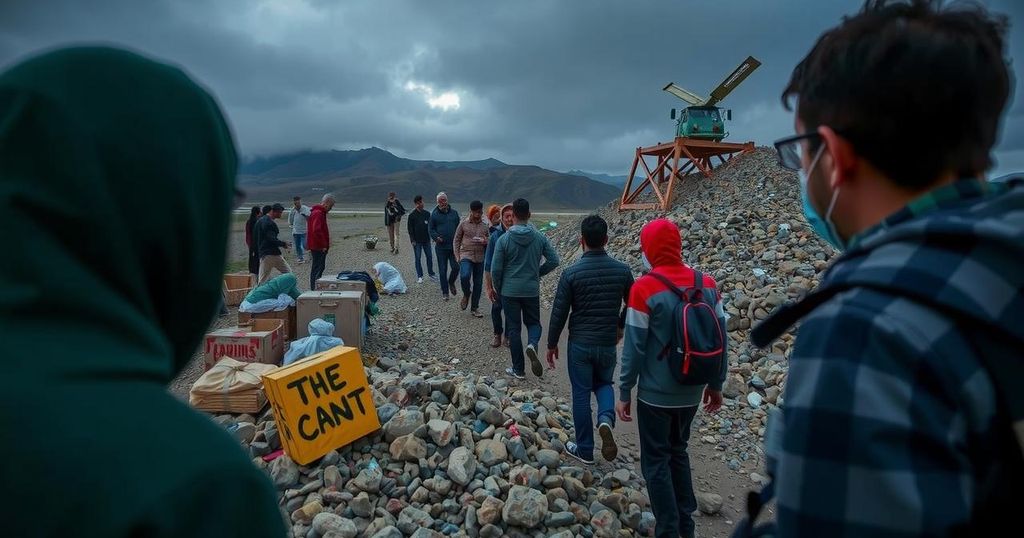The Azadi Briefing: Investigation Demanded Into Alleged Killing of Afghan Migrants at Iran Border

The Azadi Briefing reports on the urgent calls for an investigation into the alleged killing of Afghan migrants by Iranian border guards on October 13 in Sistan-Baluchistan, Iran. The Taliban has started an investigation, while Iranian officials deny the occurrence of the event. Eyewitness accounts and reports from rights groups indicate numerous casualties among the migrants, presenting a concerning escalation in the treatment of Afghan refugees. Additionally, the briefing highlights the alarming rise in malnutrition among Afghan children amid a deepening humanitarian crisis in the country.
The Azadi Briefing explores the urgent call for an investigation into the alleged killing of Afghan migrants by Iranian border guards. Reports from the United Nations and various international human rights organizations have emerged, indicating that Iranian forces fired upon Afghan migrants attempting to cross into Iran from Pakistan on October 13 in the Saravan district of the Sistan-Baluchistan province, an area characterized by poverty and instability. Although Iranian officials deny any such incident, local rights groups like Haalvsh have claimed that numerous Afghan individuals were killed by gunfire and rocket-propelled grenades during the encounter. RFE/RL has been unable to verify these allegations independently, which include distressing visual evidence purportedly showing multiple deceased individuals ensconced in white cloth. Eyewitness accounts from Afghan residents have surfaced, expressing sorrow and urging both the Afghan government and international organizations to investigate the tragic event. The Taliban regime in Afghanistan has reportedly initiated its own inquiry into the matter. This incident comes at a time when millions of Afghans have fled to Iran following the Taliban’s takeover in 2021, and many express grievances concerning the escalating violence and discrimination they face at the hands of Iranian authorities. Recent deportation figures reveal that over one million Afghan migrants have been expelled from Iran in the past year alone. Richard Bennett, the United Nations’ special rapporteur on human rights in Afghanistan, voiced serious concerns about the situation and insisted on a transparent investigation by Iran, noting the pressing necessity for safety and dignity for Afghans globally. Should the incident be substantiated, there may be amplified international scrutiny regarding Iran’s treatment of the Afghan populace residing in the country. Additionally, the briefing highlights the critical humanitarian situation in Afghanistan, where the International Federation of Red Cross and Red Crescent Societies reported increasing levels of child malnutrition. The dire circumstances, further exacerbated by economic decline and natural disasters, have led to soaring rates of acute malnutrition among Afghan children. Save the Children alarmingly estimated that up to 6.5 million Afghan children could suffer from severe hunger-related crises this year. The situation necessitates urgent attention as Afghanistan grapples with a profound humanitarian crisis; dwindling international support only heightens the risk of fatal outcomes among vulnerable populations, particularly children.
The unfolding tragedy surrounding Afghan migrants and the reported killings by Iranian border guards is emblematic of the larger migration crisis following the Taliban’s return to power in 2021. In this context, millions of Afghans have sought refuge in neighboring Iran, yet face significant challenges characterized by violent encounters, harassment, and systemic discrimination from Iranian authorities. The Sistan-Baluchistan province, known for its economic hardships and instability, further complicates the plight of these migrants. The incident also points to a broader humanitarian emergency unfolding in Afghanistan, where inadequate infrastructure, dwindling resources, and health crises are increasingly affecting the Afghan populace, especially children who suffer the dire consequences of malnutrition and poor healthcare access.
The alleged killings of Afghan migrants by Iranian border guards represent a critical flashpoint in the ongoing humanitarian crisis affecting both countries. With the Taliban’s request for accountability and the international community’s call for transparent investigations, the incident not only threatens to escalate geopolitical tensions but also underscores the urgent need for humanitarian assistance and protective measures for vulnerable Afghan migrants. The stark realities of rising malnutrition among Afghan children further emphasize the depth of the crisis, demanding immediate action from both international organizations and local authorities to avert a catastrophic outcome.
Original Source: www.rferl.org








